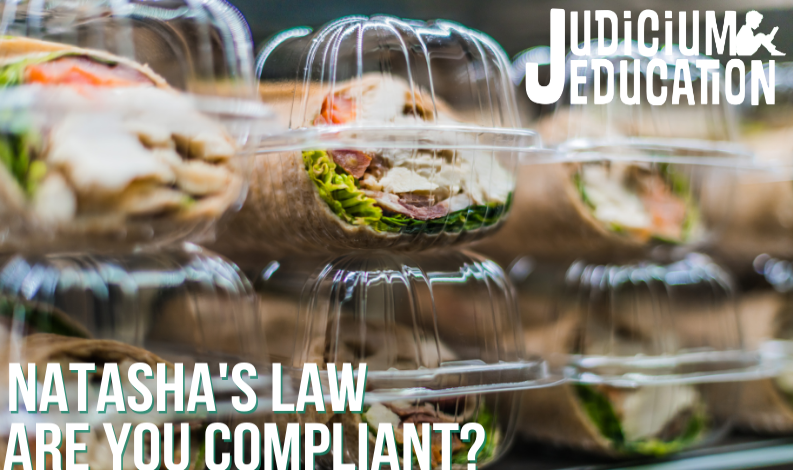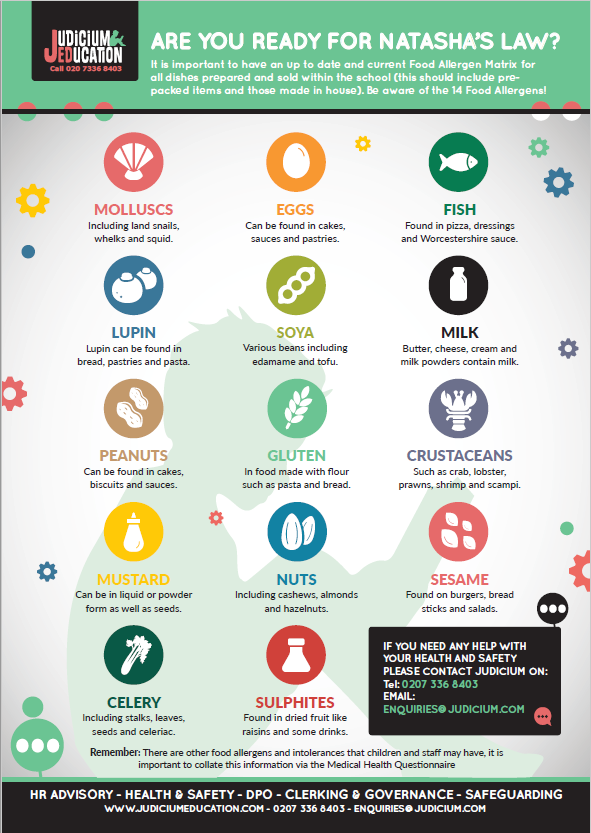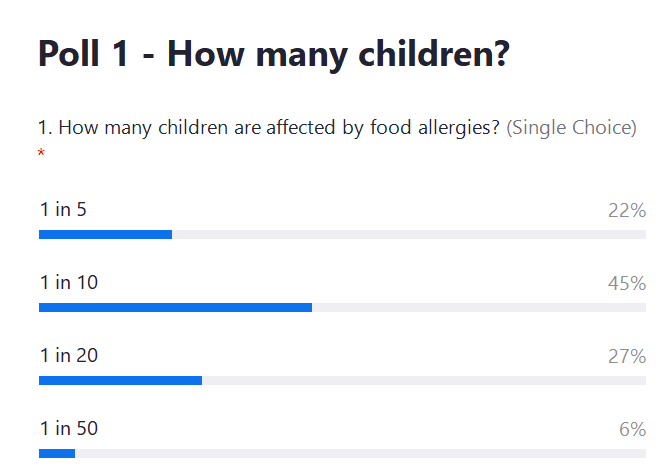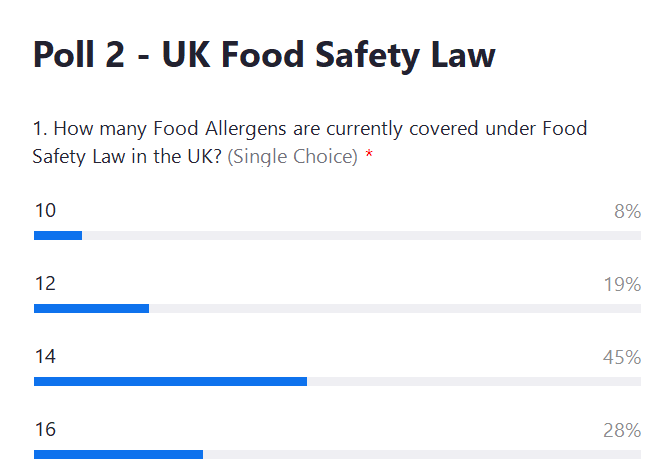Health & Safety: Natasha's Law – What Schools Need to Know

This session focused on updating your school's allergen policies, discussing what it means for pre-packaged food, what it means for ingredients provided on-site, reviewing strategies to raise awareness amongst all stakeholders (including temporary/agency staff) and analysing how Natasha's Law fits into the school's wider food safety and H&S responsibilities.
Why was Natasha's Law introduced?
In October 2021, new food information regulations for England, Wales, and Northern Ireland came into force. These come under Natasha’s Law – legislation resulting from lobbying and consultation after the death in 2016 of Natasha Edan-Laperouse from an allergic reaction to a pre-packed sandwich.
Natasha died as a result of an allergic reaction to sesame seeds, which were an unlisted ingredient in the pre-packed baguette she was eating. Leading a lobbying group, her parents campaigned for a change in the law to close the loophole.
The baguette’s packaging contained no specific allergen information, and therefore Natasha thought it was safe for her to eat. She was only 15 years old.
What do we know about food allergies and the law?
During the session we asked the below questions to learn more about what school staff already know about allergens. The results were:
*Correct Answer: 1 in 5 *Correct Answer: 14
Prevention
The Food Information (Amendment) (England) Regulations 2019
The UK Food Information Amendment, also known as Natasha’s Law, came into effect on the 1st of October 2021. It requires food businesses to provide full ingredient lists and allergen labelling on foods pre-packaged for direct sale on the premises.
Under the new rules, food that is pre-packaged for direct sale (PPDS) must display the following clear information on its packaging:
- The food’s name
- A full list of ingredients, emphasising any allergenic ingredients.
For schools, the new labelling requirements will apply to all food they make on-site and packaged, such as sandwiches, wraps, salads, and cakes. This includes food offered at mealtimes and as break-time snacks.
NB: it also applies to food the pupils select themselves or that caterers keep behind the counter.
We now need to let people know if food contain any of the listed allergens as an ingredient.
Consumers may be allergic or have intolerance to other ingredients, but only the 14 allergens are required to be declared as allergens by food law in the UK.
What are the 14 allergens?
The 14 allergens are:
- Celery
- Cereals containing gluten (such as barley and oats)
- Crustaceans (such as prawns, crabs and lobsters)
- Eggs
- Fish
- Lupin
- Milk
- Molluscs (such as mussels and oysters)
- Mustard
- Peanuts
- Sesame
- Soybeans
- Sulphur dioxide and sulphites (if they are at a concentration of more than ten parts per million)
- Tree nuts (such as almonds, hazelnuts, walnuts, Brazil nuts, cashews, pecans, pistachios and macadamia nuts).

Enforcement and Penalties
Apart from the possibility of making a someone seriously ill, you could also face the risk of financial and reputational damage if you fail to comply with allergen information requirements. Local authorities enforce allergen information regulations. It is important to note that failure to comply can result in action from the local authority. The Local Authority Environmental Health Department are appointed to oversee ALL premises that supply food within the Borough/District, including MATs and Independent schools.
If you fail to act on advice given by the local authority, an improvement notice may be issued. If you do not meet the requirements of this notice, you will be issued with a penalty.
Your duty and care is required
Schools will need to make sure that the food and ingredients they provide pre-packaged on-site meet all the labelling requirements of the new legislation.
For most schools, this will become a supplier management issue since, in many cases, you rely on outsourced caterers to supply food for pupils on-site. However, for schools that make and wrap food in-house, you will need to provide this information.
Children’s immune systems react in different ways to certain foods. A certain type of food might be safe to eat, but the body mistakes the proteins in it as harmful and responds by producing an antibody.
Some symptoms will be more severe than others, ranging from a runny nose and itchy eyes to skin reactions, breathing difficulties, nausea, and diarrhoea.
Recent prosecutions
The good news is there have been no recent prosecutions for a schools regarding regulation breaches in respect of allergen information. That means schools as a whole are doing a great job at protecting their students. But, with the new regulation there is an increased chance schools could face similar prosecutions as those listed below:
- A restaurant in Derby was fined £2,000 and ordered to pay £5,000 costs. Also, the director, was fined £320 and ordered to pay costs of £1,000 and a victim surcharge of £34. A product contained peanuts but no details or warnings were provided to the customer.
- A restaurant in Staffordshire was fined £5,231.82, ordered to pay a £90 victim surcharge, and was given a 12-month community order which included 8 hours of unpaid work and 30 rehabilitation activity days. This was for substituting nuts – using peanuts instead of almonds.
Anaphylaxis
Anaphylaxis is a severe and potentially life-threatening reaction to a trigger such as an allergy. It usually develops suddenly and gets worse very quickly. The symptoms include:
- feeling lightheaded or faint
- breathing difficulties – such as fast, shallow breathing
- wheezing
- a fast heartbeat
- clammy skin
- confusion and anxiety
- collapsing or losing consciousness
There may also be other allergy symptoms, including an itchy, raised rash (hives); feeling or being sick; swelling (angioedema) or stomach pain.
What to do if someone has anaphylaxis:
Anaphylaxis is a medical emergency. It can be very serious if not treated quickly. If someone has symptoms of anaphylaxis, you should:
- Use an adrenaline auto-injector if the person has one – but make sure you know how to use it correctly first.
- Call 999 for an ambulance immediately (even if they start to feel better) – mention that you think the person has anaphylaxis.
- Remove any trigger if possible – for example, carefully remove any stinger stuck in the skin.
- Lie the person down flat – unless they're unconscious, pregnant or having breathing difficulties.
- Give another injection after 5 to 15 minutes if the symptoms do not improve and a second auto-injector is available.
People with potentially serious allergies are often prescribed adrenaline auto-injectors to carry at all times. These can help stop an anaphylactic reaction becoming life threatening. They should be used as soon as a serious reaction is suspected, either by the person experiencing anaphylaxis or someone helping them.
There are 3 main types of adrenaline auto-injector, which are used in slightly different ways: EpiPen, Jext, and Emerade.
It is therefore important that staff have sufficient training and awareness of how to use the auto-injectors.
Next steps and support
Check with your catering team that they have the following controls in place:
- Does the school have an Administration of Medicines Policy, including a Food Allergy Policy.
- Who is responsible for managing this?
- Are all staff aware of these policies?
- Have all catering staff and catering support staff received Allergy Awareness Training & records retained.
- Where are the training records retained?
- What is the frequency of training?
- Have the catering team received all staff and student allergy requirements?
- How do they monitor everyone ordering the food items?
- Do they have a picture of the person and a list of known allergens listed below?
- How often is this checked or updated?
- Has an Allergen Matrix been made available for dishes served?
- This should be dated and current to the menu offering for that day/week/fortnight.
- It should cover all items on the menu offering.
- Have all dishes been reviewed for allergen contents?
- Do the Catering team continue to review the individual ingredients and at what is the frequency?
- Suppliers may substitute ingredients or products that previously didn’t have an allergen contained, therefore the packaging label should be crossed checked with the schools allergen matrix & updated when required.
- Remember to re-date the allergen matrix
- Have all purchased pre-packaged items been provided with the list of all ingredients?
- Are allergen details provided in bold?
- Who is responsible for checking that food allergens are managed within the catering team to comply with the current legal requirements?
Helpful Links
Further Guidance can be obtained from The Food Standards Agency: https://www.food.gov.uk/business-guidance/allergen-guidance-for-food-businesses
The Food Standards Agency has also published guidance about the new requirements for PPDS food.
https://www.food.gov.uk/business-guidance/introduction-to-allergen-labelling-changes-ppds
Peanut Allergy - Peanuts are a common cause of food allergy, caused when the immune system reacts to the protein found in peanuts. Peanut allergy affects around 2% (1 in 50) of children in the UK and has been increasing in recent decades. It usually develops in early childhood but, occasionally, can appear in later life. Peanut allergy tends to be persistent and only approximately 1 in 5 children outgrow their allergy, usually by the age of 10. - https://www.allergyuk.org/resources/peanut-allergy-factsheet/
Judicium Education’s Health and Safety Advisory Service is designed to support schools, firstly, in ensuring a safe working and learning environment, secondly, in complying with the legal requirements imposed on them as employers under the various Health & Safety laws and regulations. For more information, please visit here.
If you require any support in any of these steps, or would like to talk to someone surrounding some support for your school please do not hesitate to call us on 0345 548 7000 or email enquiries@judicium.com
If you’d like to review Judicium’s forthcoming sofa sessions please click here
Related content
.png)
This blog is based on Judicium’s Health and Safety ‘Sofa Session’ from the 7th January 2026, with our resident expert Jamie Ashard CMIOSH. This session focused on Common key stressors in the education sector, Applying the 6 key HSE management standards for stress, Completing a stress risk assessment and implementing practical solutions.
.png)
This blog is based on Judicium’s Health & Safety and SEND session on 26th November with resident expert India Cottenden
.png)
This blog is based on Judicium’s Food Safety Sofa session on 12th November with resident experts Sue Roberts and Tracey Killick

This blog is based on Judicium’s Health and Safety ‘Sofa Session’ on the 15th of October, with our resident expert Mike Wright.

This prestigious award celebrates our commitment to delivering expert, education-specific Health & Safety support that lifts the burden for school teams while raising safety standards across the sector.

This blog is based on Judicium’s Health and Safety ‘Sofa Session’ from 18th June, led by resident expert , Mike Wright, CMIOSH. This session focuses on the control of substances hazardous to health (COSHH) and their relevance in school settings, how assessments should be undertaken and what staff could be at risk.



Sofa Sessions | H&S